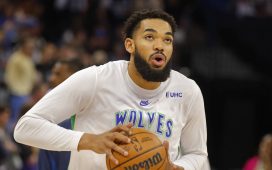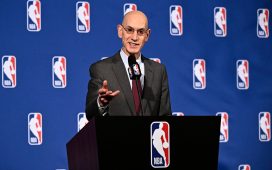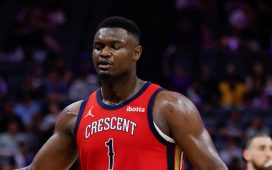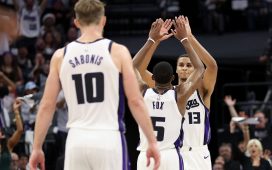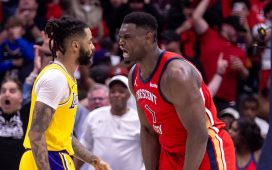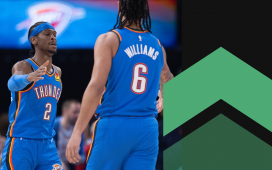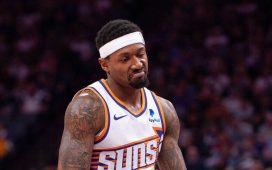The idea for Tracy McGrady’s newest business venture started through conversations with his two teenage sons and their AAU teammates. McGrady’s kids are 13 and 16 and the exact age every sport is trying to reach. They’re having trouble because, according to McGrady, his sons and others just don’t watch their games anymore.
They don’t watch the NBA, he said — even though McGrady is a Hall of Fame basketball player. They don’t watch college basketball. They watch YouTube highlights. They are on social media.
“They just don’t have the attention span to watch a two-and-a-half, three-hour live sporting event,” he said.
When McGrady walks around AAU gyms, he gets asked about one-on-one matchups. About who would win: him or Kobe Bryant, him or Kevin Durant, him or LeBron James? After a while, McGrady picked up on the trend, then on a business idea.
Last month, McGrady debuted the Ones Basketball League, a league centered around one-on-one basketball. For seven weeks, the league will travel the country and crown champions in seven cities, before a winner-take-all event for $250,000 in Las Vegas.
Ones Basketball League is McGrady’s latest project in what has already been a busy post-playing career. Around stints in minor league baseball and as a talking head on ESPN, he has started his own basketball representation agency and now a league of his own.
OBL came from his appreciation for one-on-one basketball and its universal place in the sport. He, like almost everyone else in the basketball world, has played plenty of one-on-one ball, and that version of basketball calls for a different skillset than in a team setting, which will allow his league to highlight different players.
“Everybody can’t make it to the NBA,” McGrady said in an interview with The Athletic. “Everybody can’t make it across seas or don’t want to go overseas, so I wanted to create a platform for those guys that still play at a high level of basketball, still have a love for the game of basketball but also give them a second chance at fulfilling their dream.
“This is the platform that I’m creating. And why not 1-on-1 basketball? It’s a global sport. We sit here and watch tennis. We sit here and watch guys boxing. MMA. Basketball is a universal sport. It’s global. It’s the pure essence of basketball. Even in five-on-five, there’s one-on-one matchups. I just wanted to rebrand what one-on-one basketball is because I think people (think) it’s streetball. It’s so much more than that. So here we are. I really want to create stars out of my league.”
McGrady said he is self-funding the first season of OBL and has not taken any outside investors.
The cost, he says, is sizable. He called it “a nice chunk of change.”
“I’m going deep into the pockets,” McGrady said. “But it’s OK because I believe in it. … I’m putting my money where my mouth is and I think this is something that the consumers and the fans will love to watch.”
John Jordan, a 29-year-old, won the first competition in Houston. Glen Rice Jr., a 2013 second-round pick who played in 16 NBA games, won the tournament in Atlanta.
The OBL has tweaked some of the usual rules for 1-on-1. Most importantly, McGrady said, defense is a must, so there are alternating possessions. There is also a 12-second shot clock.
McGrady hopes to build stars in his league and he smiles at the thought of eventually making it a global entity. While the success of the Big 3 provided some inspiration for him, he says he did not need a further proof of concept that a basketball league could work. He wants to first identify a model that works while touring North America and then license it abroad, hoping to eventually crown the best 1-on-1 players in other countries. The nature of that business, he believes, allows the OBL to do what other leagues cannot.
He also has a media plan in place. The OBL has already signed a partnership with SLAM for the company to create digital content all season long. McGrady said he has spoken with streaming partners and local television to serve as broadcasting homes, and he says there have been discussions with Showtime. He believes that the individual nature of his league could allow stars to grow and to lean into personalities as a selling point.
“If you’re really good in this Ones league and you have a great personality, who knows what you can become,” McGrady said. “Look at the UFC guys. Think if we had a guy in my league that has that personality and becomes like a Conor McGregor and he’s really freaking good. That can very well happen in OBL. That’s what this league is all about.”
McGrady believes the OBL has been successful so far, based on the reaction of those who inspired him and who have an ear to the ground for what’s next.
“I listen to the kids, man,” he said. “They tell you everything.”
The feedback from his children and their friends has been extremely positive, he said. Full-length games, even playoff games, don’t resonate with them, McGrady adds; they focus on short-form content. The OBL is designed to satiate those needs.
McGrady, 42, has become an entrepreneur since he retired in 2013. He spent four-plus years on ESPN. In 2020, he started Seven1 Sports Group, a basketball agency he founded with Jermaine O’Neal.
A slow wind-down never sat well with McGrady. He said he wanted new challenges.
“I can’t go and sit on the beach forever and sip Mai Tais or whatever you do on the beach,” he said. “I’ll get bored with that. I gotta get back to work, get back to learning and building.”
The agency is going well so far, he said. It has signed several players to Name, Image and Likeness deals and will represent a few players likely to be selected in the NBA draft, including Gonzaga star Drew Timme.
While it was built on the brands of two former NBA All-Stars, McGrady said there has been a learning curve. He called the agency “a small fish in a big pond just starting out.” They have had to deal with families and AAU coaches and the entire amateur landscape, which was only made more difficult this past season with the new NIL ecosystem.
Even for him, there have been surprises.
“It’s definitely cutthroat,” McGrady said. “You can feel like you have a player in your pocket, but at the last minute, someone comes in and offers a significant amount of money to take him away from you. There’s really nothing you can do, because these guys … That’s how it is. That big fish is coming — nah, let me take him away from you; we got deeper pockets.”
Potential clients, he has found, have different preferences. Simply being T-Mac isn’t always enough.
McGrady said their pitch, and the reason they started the agency — though neither McGrady or O’Neal are certified by the NBPA — is to impart the wisdom they accrued over their NBA careers as two players who went straight to the league from high school.
“Some clients may look at it as, ‘man, I get to have access 24/7 to Jermaine and T-Mac on this basketball stuff and also on the business side.’ But also you have those clients like ‘I respect Mac and Jermaine but I got to go over here and get this bag because they’re offering more.’ It goes one way or the other how they feel. When you look at what Jermaine and I are building, two guys that came out of high school, went on and had a successful NBA career, and he made six All-Stars and I made seven, just the information and the knowledge that we got from playing in the league, I think we have enough to give back to the up-and-coming generations.”
If you think legalized sports gambling is everywhere now, you’re probably right. If you want to know why, look no further than New York City, where it was legalized at the start of 2022. MSG Sports, which is the company that owns the Knicks and Rangers, has deals in place with two sports betting companies and just signed a third. The money those deals bring in is so large that MSG Sports president Andrew Lustgarten made a revealing statement on the company’s earnings call last week.
“Mobile sports betting now represents our largest revenue category in marketing partnerships on a run-rate basis,” he said.
There’s a lot of money to be made by teams in sports betting, not just the gambling companies themselves. And that’s why fans will continue to see it so readily whenever they watch games on TV or go to arenas — or just about anywhere else.
(Photo of Tracy McGrady and his family courtesy of OBL)
